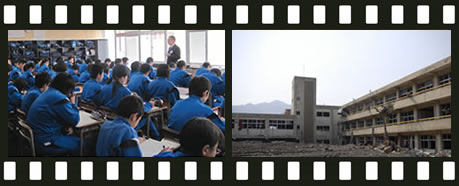Activities
“Learn through Q&A: Disasters and psychological care”
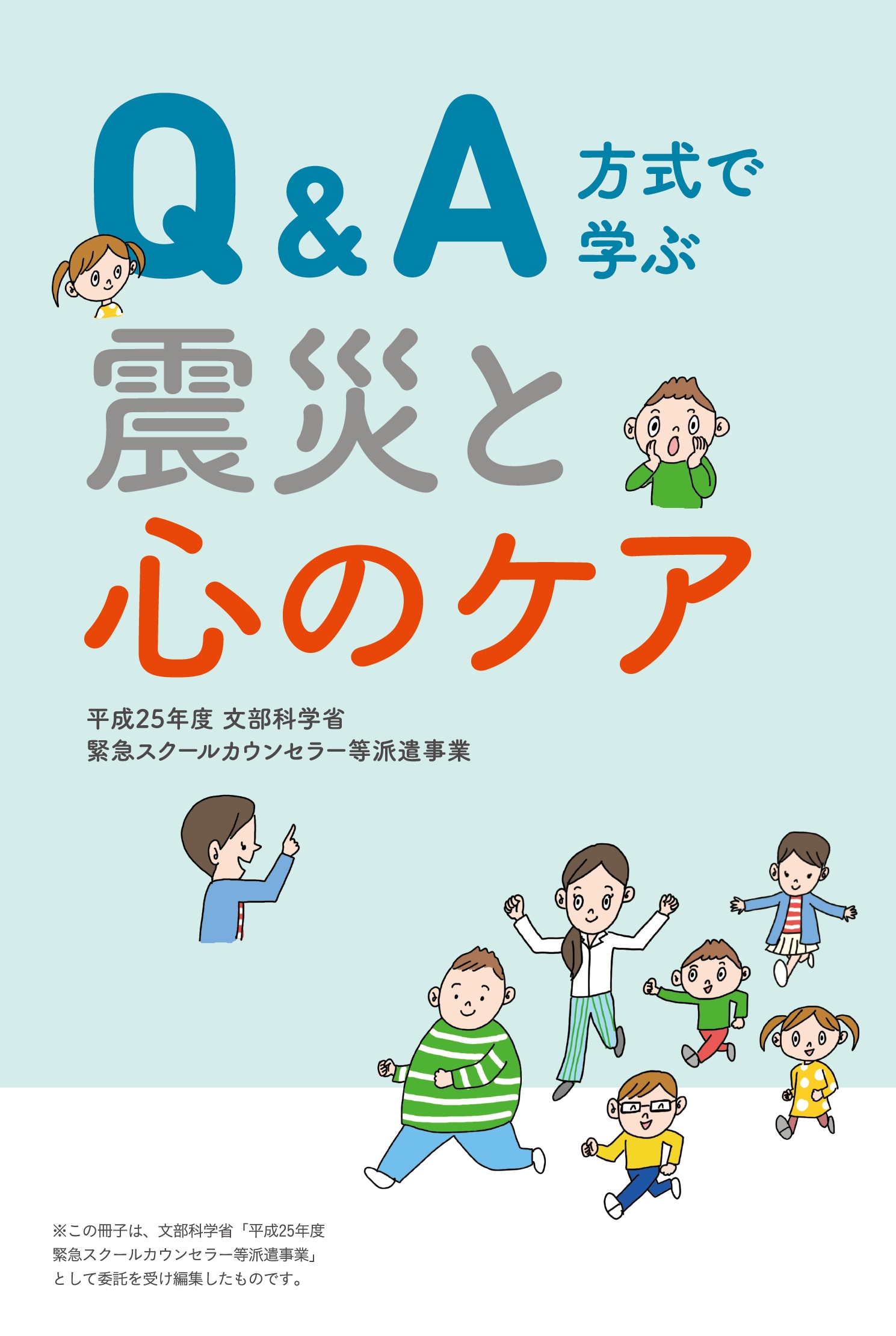
We developed the “Learn through Q&A: Disasters and psychological care” (part of the emergency work in FY2013 by the Ministry of Education, Culture, Sports, Science and Technology to dispatch school counsellors) booklet as part of the emergency work in FY2013 by the MEXT for dispatching school counsellors under permission from the Board of Education of Miyagi Prefecture, Iwate Prefecture, Fukushima Prefecture, and Sendai City. We have distributed the booklet to approximately 3,000 public and private kindergartens, elementary schools, junior high schools, senior high schools and schools for special needs education in Iwate, Miyagi and Fukushima Prefectures.
Through our efforts to support schools in the disaster-hit areas, which we have been continuing since shortly after the disaster, we recognised the importance of communicating to adults specific methods of psychological care for the children around them. Last fiscal year, we produced the “Psychological Support Video Collection” which is a recording of methods to cope with stress caused by the disaster. This video collection was put to use in school classes and teacher training in each region, and there were schools that even incorporated videos in their weekly school assembly. For FY2013, we developed and started distributing a Q&A format booklet that answers in a pinpoint fashion the “what do we do in this situation?” worries and doubts that we had received the most requests from schools about.
Three years have passed since the Great East Japan Earthquake, and psychological support for children in the disaster-hit areas is becoming an even more serious issue. From the day when the booklet was distributed, we have been receiving numerous inquiries from kindergartens and schools. Further deliveries of the booklet will be made with written applications based on the number of booklets remaining in stock on a postage-to-be-paid-on-delivery basis.
コミュニティマガジン『EDUPONT』(エデュポン)
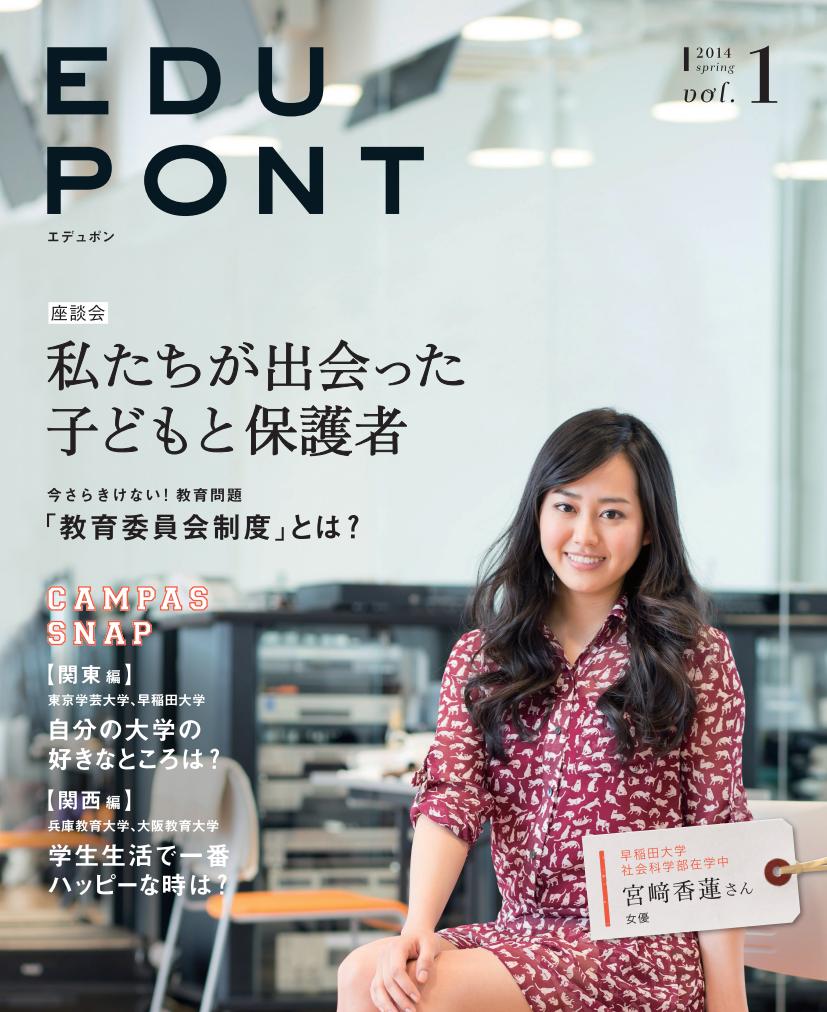
We have started publication of EDUPONT, a community magazine to support the young people who will support education in the future. It will be distributed to all education universities, and all universities having an education department, starting with Tokyo Gakugei University, Hyogo University of Teacher Education, and Osaka Kyoiku University.
The name EDUPONT comes from the English word “education”, and the French word “pont”, meaning bridge, and the magazine aims to serve as a bridge between education and society, as well as university students and classrooms by conveying information about classrooms and education to university students.
Editing is done with a “participation” system ? by creating a special “student correspondent” system, allowing university students to prepare interview reports, and by giving students the opportunity to talk to alumni and students from other universities. We hope that, by creating media, we will be able to develop a network of students wanting to become teachers. We also hope to provide a place for useful information and opportunities for students where they can turn their ambitions into action. By offering more points of contact between society and young people who will be the providers of education in the future, we aim to construct a scheme that allows the entire society to ponder on the future of education.
“Gakko Oen Dayori-psychological support edition” Gakko Oen Dayori
We published “Gakko Oen Dayori-psychological support edition Gakko Oen Dayori”, and distributed it to approximately 32,000 public and private elementary schools and junior high schools across Japan.
Through our activities to support reconstruction in the disaster-hit areas, we recognised the importance of communicating to adults specific methods of making use of psychological care for the children around them. We developed and distributed the “reconstruction support edition” for schools in the disaster-hit areas in November 2011. After the publication, we received comments such as “we’re not in the disaster-hit area, but we’d like copies because there are many students who need psychological support” and “we would like more examples and case studies”. So, we published a special stress management edition aimed at educational institutions across the country that could be used on a daily basis.
>>Click for details
|
 |
Emergency work to dispatch school counsellors (FY2012)
Now that more than 18 months have passed since the Great East Japan Earthquake, in the disaster-hit areas there is the need for more meticulous psychological support adapted to the state of reconstruction and domestic circumstances for each person. (The Hyogo Prefecture Board of Education found that although the number of pupils and students who needed psychological support did not decrease five years after the Great Hanshin Earthquake, the factors changed over time from shock in experiencing the disaster to parental conflict, economic problems and the like.) At this point, while it is ideal for the teachers and guardians who have daily contact with children to provide support, in actual fact the teachers and guardians who would provide support in the disaster areas are already emotionally stretched and do not have time to spare.
This programme makes use of teaching videos containing model instructions provided by specialized clinical psychotherapists. In order to get teachers and guardians who lack knowledge and experience involved, the programme makes it possible for viewers to provide ideal psychological support to the children, and to themselves as well.
>>Click for details
|
|
Gakko Oen Dayori ? reconstruction support edition
We developed a special edition aimed at educators and guardians about psychological support for children, as work subsidized by Incorporated Foundation JKA to support reconstruction from the Great East Japan Earthquake. The special edition was distributed to approximately 450 public and private schools in the disaster-hit areas. (September 2011)
=Table of Contents=
◆Opening interview
Homare Sawa
◆Gakko ?en News (School Support News)
Disaster prevention education ? aiming for the reconstruction
◆Special edition ? psychological support for children
◆Immediately useful recommended information
…and so on
>>Click here for details |
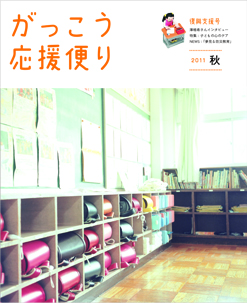 |
The booklet was made with a subsidy from Keirin (cycle racing).
 |
Video of symposium held by Alliance of Public Services Workers Unions ? “with everyone’s help”
Video of symposium held by Alliance of Public Services Workers Unions ? “with everyone’s help”
This video was shown in a symposium questioning what the public services should be doing. It includes videos of interviews with the heads of government for the three disaster-hit prefectures interspersed with records of workers for public services.
(March 2012)
|
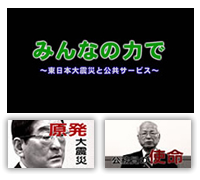  |
|
Video material collection about the Great East Japan Earthquake
A portion of the videos recorded of towns hit by the disaster as well as scenes from educational institutions were turned into video material for use as educational support, disaster-prevention education and the like. It was distributed to the 23 organisations that make up the Educational Organisation Liaison Committee.
“Kodomo Oen Dayori” editing room, 23 organisations of the Educational Organisation Liaison Committee
(July 2011) |
|
|







